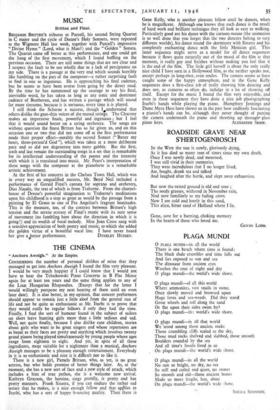MUSIC
Britten and Finzi.
BENJAMIN BRITTEN'S tributes to Purcell, his second String Quartet in C major and the cycle of Donne's Holy Sonnets were repeated at the Wigmore Hall last week, together with Purc:ell's impressive "Divine Hymn" (Lord, what is Man?) and the " Golden " Sonata. The Qnartet came off better at this performance, and one could get the hang of the first movement, which I found baffling on the previous occasion. There are still some things that are not clear and I suspect the fault to be not wholly due to a lack of percipience on my side. There is a passage at the very end Which sounds horribly like fumbling on the part of the composer—a rather surprising fault to find in one so ingenious. He is approaching his final cadence, but he seems to have been averse from going by the direct road. By the time he has summoned up the courage to say his final, inevitable word, he has taken as long as any tonic and dominant cadence of Beethoven, and has written a passage which will sound far more tiresome, because it is tortuous, every time it is played.
I still think the Scherzo a success, though Isunderstand that others dislike the gnat-thin voices of the muted strings. The Chacony makes an impressive finale, powerful and ingenious • but I feel that it would sound better on a string orchestra. The songs are without question the finest Britten has so far given us, and on this occasion one or two that did not come off at the first performance made their proper effect—notably the second Sonnet (" Batter my heart, three-person'd God "), which was taken at a more deliberate pace and so did not degenerate into mere gabble. But the first, sixth and last remain the outstanding songs in a set that is remarkable for its intellectual understanding of the poems and the intensity with which it is translated into music. Mr. Pears's interpretation of these songs with the composer at the pianoforte is a remarkable artistic achievement.
At the first of his concerts in the Chelsea Town Hall, which was in every way an unqualified success, Mr. Boyd Neil included a performance of Gerald Finzi's cantata for soprano and orchestra, Dies Natalis, the text of which is from Traherne. From the charnel- house of Donne's powerful imagination to Traherne's meditations upon his childhood is a step as great as would be the passage from a painting by El Greco to one of Fra Angelico's fragrant beatitudes. This is the measure, too, of the contrast between Britten's high tension and the serene ecstasy of Final's music with its sure sense of movement (no fumbling here about the direction in which it is going!) and its wealth of vocal melody. Miss Joan Cross sang with a sensitive appreciation of both-poetry and music, to which she added the golden virtue of a beautiful vocal line. I have never heard






























 Previous page
Previous page